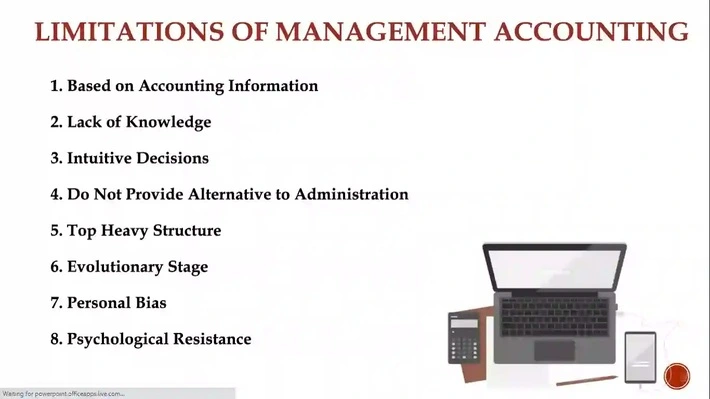Table of Contents:-
What are the limitations of Management Accounting?
Limitations of Management accounting is concerned with the presentation of accounting information to the management in such a way as to assist them in their managerial functions of decision making, planning and control. Management accounting was developed because of management’s demand for information on past and present-day modern operations for foretelling coming trends.
The management accounting system acts as a decision support system for giving accurate information to the right people at the correct time. Management accounting is only used by the internal team members of the organization, and it deals with accounting information for managerial decision-making purposes. Management accounting is dynamic and forward-looking. It provides different methods for making decisions, solving problems, planning and controlling the business. Management accounting intends to help managers to manage their organisations easily. It is a value-adding process that guides management actions and motivates the behaviour of organisational people.
It creates cultural values important to achieve an organisation’s tactical, strategic, and operating objectives. An effective management accounting system can create significant value for organisational progress by giving timely and accurate information about the various activities required.

Limitations of Management Accounting
The following are the Limitations of Management Accounting:
-
- Based on Accounting Information
- Lack of Knowledge
- Intuitive Decisions
- Do Not Provide an Alternative to Administration
- Top Heavy Structure
- Evolutionary Stage
- Psychological Resistance
- Personal Bias
1) Based on Accounting Information
The correctness and effectiveness of managerial decisions will depend upon the quality of data on which these decisions are based. If financial data is not reliable management accounting will not provide correct analysis.
2) Lack of Knowledge
The use of management accounting requires the knowledge of several related subjects like financial accounting, psychology cost accounting, economics, sociology etc. The organization can obtain more benefits from management accounting if the management accountant has a thorough knowledge of related subjects. If not, the success of the management accounting system is uncertain.
3) Intuitive Decisions
With the help of management accounting techniques, scientific decisions can be taken that enable decision-making based on facts and figures. However, many top-level executive and management accountants prefer their intuition and prior experience in making business decisions. Management may avoid a lengthy course of deciding things and may take an easy course of arriving at decisions using intuition because intuitive decision-making is very simple and easy.
4) Do Not Provide an Alternative to Administration
Management accounting is not an alternative to administration. The techniques and methods of management accounting provide only learning, data, information, and knowledge, and not conclusions. Both decision-making and implementation of plans are done by the management.
5) Top Heavy Structure
The establishment of an effective management accounting system needs a detailed organizational system. A great number of rules and regulations are also required to make this system fruitful and workable. The introduction of a management accounting system is a costly affair and can be used by big concerns only. Small organisations cannot afford to use this system because of huge costs.
6) Evolutionary Stage
Management accounting is in the developing stage. Its conventions are not as accurate and installed as other branches of accounting. The techniques and tools used by this system give very different results. Management accounting will take some time before it takes a final shape.
7) Psychological Resistance
The introduction and operation of a management accounting system involve a basic change in an organizational setup. New rules and regulations are also required to be framed which affect several employees and hence there is a possibility of resistance from some quarters or others.
8) Personal Bias
The interpretation of financial information depends upon the capability of the interpreter as one makes a personal judgment. There is every possibility of personal bias in interpretation and analysis. Personal bias and prejudices affect the objectivity of decisions.
